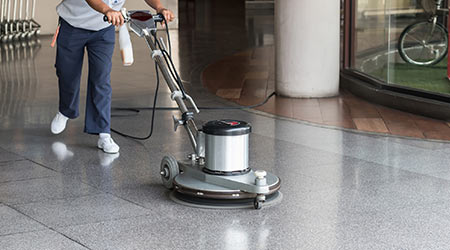
Today’s floor pads offer sustainability benefits that extend well beyond diverting plastic bottles from landfills. In addition to using recycled and renewable resources, manufacturers are paying closer attention to the lifecycle of their products and adopting measures — from manufacturing to disposal — to reduce their environmental impact.
“We take a holistic view of sustainability, and all our pads have at least one sustainability attribute to them,” says Adrian Cook, marketing manager for 3M Commercial Solutions Division, St. Paul, Minnesota. “The attributes we consider could take the form of the raw materials that go into the pads, the processes we use to manufacture them, the performance of the pads and their durability, and their lifecycle once they’re disposed of.”
Manufacturers offer floor pads made with virgin material as well as recycled plastic and natural fibers, depending on performance needs. The packaging of the floor pads is likewise recycled and — unlike the floor pads — recyclable.
“Recycling and recycled content has come a long way in recent years and is beneficial to all levels in the supply chain,” says Rory Beaudette, vice president of sales/COO for ACS Industries Inc., Lincoln, Rhode Island. “We all have an environmental responsibility, and with floor pads this is a common-sense decision.”
Although manufacturers are successfully using recycled material to create new floor pads, the pads themselves cannot be recycled. And what happens to floor pads once they enter a landfill is still a matter of debate.
In California, regulations ban biodegradability claims on all plastic products, stipulating that there is no guarantee these plastics will break down in a landfill.
“If you look at the conditions of biodegradability testing, it really does not mimic real-world landfill conditions,” says Cook. “We think the more relevant sustainability attribute is the durability of the pad. You want to put less material in the landfill, period.”
While some manufacturers steer clear of biodegradability claims all together, Americo Manufacturing Co., Acworth, Georgia, recently achieved certification for its biodegradability claims related to the company’s Full Cycle floor pads via Green Seal’s GS-20 standard for environmental innovation.
“The floor pads are made with 100 percent recycled PET fiber or a combination of that and natural fibers,” says John Miller, executive vice president of sales and marketing. “The pads have been tested by an independent lab to demonstrate that they biodegrade at a faster rate than conventional floor pads in a simulated landfill environment.”
Americo is the first company to complete certification for GS-20, a new program that was introduced earlier this year, says Daniel Pedersen, vice president of Science & Standards for Green Seal, Washington, D.C.
“GS-20 is a program for environmental innovation and claims validation for any company that wants to make an environmental claim about their product or service,” he says. “We do a lifecycle evaluation of your product and the claims you want to make, and verify that those claims are significant, real and outweigh any drawbacks. Products that are rare in their market can get certified for innovation.”
Pedersen points out that biodegradable plastics have both advantages and disadvantages.
“If it’s inert, it just sits in the landfill and takes up volume,” he says. “If it biodegrades, the volume will shrink, but it will release greenhouse gases. If those gases are not captured and burned to create power then you would be contributing more to greenhouse gas emissions by choosing a biodegradable plastic over a non-biodegradable plastic.”
According to Miller, Americo provides end-of-life instructions to the market for disposing of its pads in landfills that capture landfill gas and convert it to energy. However, Pedersen notes that currently only one-third of the landfills in the United States have methane capture projects that generate electricity.
“Chances are if you dispose of plastics they’re not going to end up in a landfill that converts gas to power,” he says.
Floor Pads Made With Biobased Materials

 The Down and Dirty on Cleaning in Virus Season
The Down and Dirty on Cleaning in Virus Season How Surfactant Use is Expanding in Commercial Cleaning
How Surfactant Use is Expanding in Commercial Cleaning Operational Excellence Series 2025: Better Budgeting
Operational Excellence Series 2025: Better Budgeting
